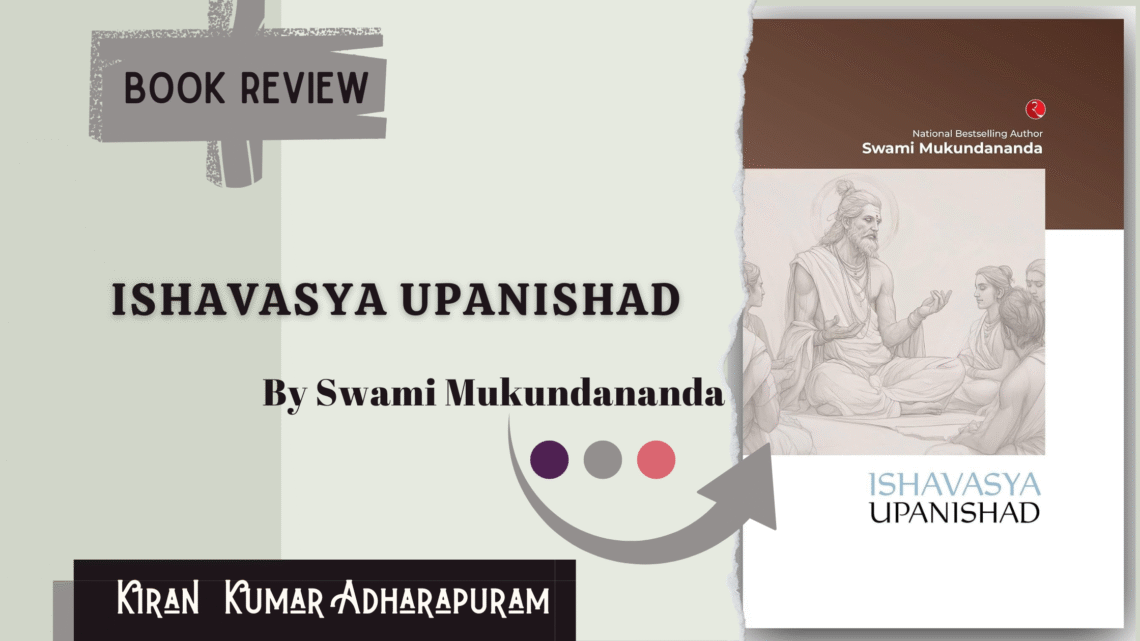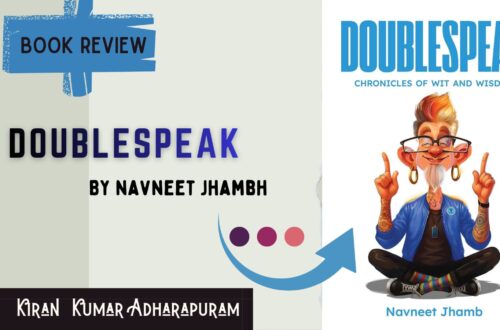Book Prelude..!!
Title: Ishavasya Upanishad
Author: Swami Mukundananda
Pages: 312
Genre: Non-Fiction [Self-Help]
Publication date: 26 May 2025
Rating: ⭐⭐⭐⭐⭐
About Author..!!
Swami Mukundananda is a world-renowned teacher of Spirituality, Yoga, and Meditation. He is the founder of the yogic system called JKYog, also known as Yoga for the Body, Mind, and Soul. Swamiji is a unique sanyasi (monk), who has a distinguished technical and management educational background as well. He completed engineering and management from two world-renowned institutes: the Indian Institute of Technology (IIT) and the Indian Institute of Management (IIM). However, an illustrious education and a promising corporate career did not quench his thirst for knowing the Absolute Truth.

Ultimately, his search took him to the lotus feet of his Spiritual Master, Jagadguru Shree Kripaluji Maharaj. Under the guidance of Shree Maharajji, he studied the Vedic scriptures and practiced intense sadhana. His Guru then entrusted him with the key task of propagating the ancient knowledge of the Eternal Truth all over the world. For the last three decades, Swamiji has been traveling far and wide, awakening hundreds of thousands of seekers. He has a God-gifted ability to keep all kinds of audiences enthralled and entertained through wisdom-filled anecdotes, humorous stories, and irrefutable logic.
Shree Swamiji has inspired people all over the world on the path of spirituality, holistic health, yoga, meditation, service to society, and God-realization. His warmth and humility touch all those who have had the fortune to have his association. In fact, his very presence radiates grace and bliss.
Book Description..!!
Upanishads help us solve the mystery of life and creation..!!!
They reveal to us the nature of the Absolute Truth. The knowledge they expound is unmatched in its sublimity. Along with philosophic insights, the Upanishads provide clear methodologies for spiritual elevation. They are eminently capable of guiding souls from material bondage to spiritual perfection. For this reason, these holy books are held in the highest esteem.
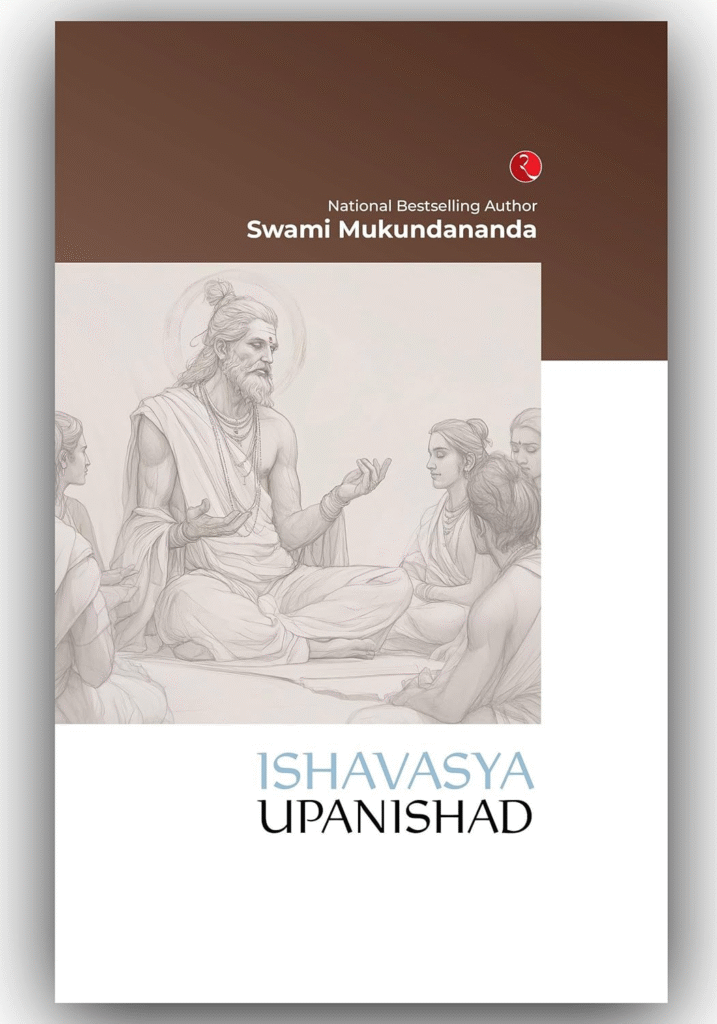
The Ishavasya Upanishad is considered the first Upanishad in the Vedic structure. Its beautiful and profound name means “the Upanishad of the all-pervading God.” The uniqueness of this sacred text is that it skilfully resolves contrary viewpoints. And in doing so, it provides the wisdom for achieving a harmonious balance among the different dimensions of life.
Vedas, The Intro…!!
India (भारत, Bharat) is the land of the rich Sanātana Dharma (eternal religion), which is a granary of eternal knowledge (अपौरुषेय ज्ञान, apauruṣeya jñāna) that we call the Vedas. According to the philosophy of Madhvacharya, this knowledge is divided into four major branches:
- Samhita – Hymns dedicated to various deities
- Upanishads – Philosophical and elemental appraisals of Bhagavan (the Divine)
- Brahmanas – Ritualistic ceremonies (Karma-kāṇḍa) and their commentaries.
- Āraṇyakas – Hymns intended to be recited in seclusion, preferably in the forests (āranya)
Among the four classical branches of Vedic literature you mentioned, the Upanishads—often termed as Vedanta—are specifically celebrated as apauruṣeya (perpetual or authorless), signifying their origin as eternal truths not attributed to any human author but revealed as divine knowledge. They are foundational texts representing the philosophical essence and spiritual knowledge of the Vedas.
What is Ishavasya Upanishad????
Śrīmad Ānandatīrtha (Madhvacharya), the founder of the Dvaita (dualistic) school of Vedanta, wrote detailed commentaries on ten principal Upanishads. This collection is renowned as the Daśopaniṣadbhāṣya (दशोपनिषद्भाष्य)—the commentary on the ten Upanishads. The ten Upanishads on which Madhvacharya (Śrīman Ānandatīrtha) wrote his bhāṣyas are:
Isa-Kena-Katha-Prasna-Munda-Mandukya-Tittari
Aitareyam ca Chandogyam Brhadaranyam EvaCha
Ishavasya Upanishad, also known as Ishopanishad or YagneyaMantropanishad (the Upanishad of the all-pervading deities), is the very first Upanishad and consists of 18 mantras. It is the shortest among the principal Upanishads. Ishavasya presents the most profound mantra form to understand the Guṇa (गुण), or virtues, of Bhagavān Vishnu, portrayed as the Yajña-nāmaka Paramātma. It is commonly attributed to the sage Swayambhuva Manu as the ṛṣi (seer) of the Upanishad, who is said to have “rendered” or revealed it through spiritually insightful composition of 18 shlokas by Swayambhu Manu, praising the Parama-Atma (Supreme Soul).
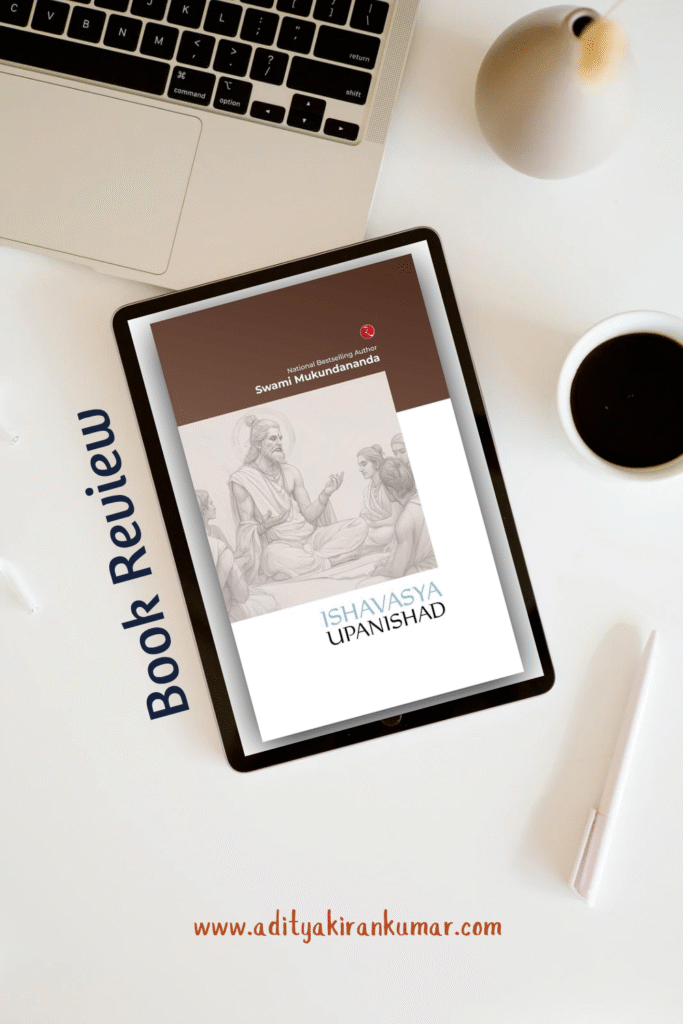
“It begins with two beautiful shlokas that provide a qualitative checklist for practicing Brahma Vidya. Bhagawan Vishnu emphasizes the importance of owning and practicing Karmanusthana and Vairagya, referring to this as true competence.”
īśā vāsyam idaṃ sarvaṃ yat kiñca jagatyāṃ jagat |
tena tyaktena bhuñjīthā mā gṛdhaḥ kasya sviddhanam ||
“The entire universe is owned and governed by Śrī Mahāviṣṇu(श्री महाविष्णु). Therefore, the craving for possessions and desires goes against the principles of asceticism. As beings under His control, we perform our duties as long as we are entitled to exist in this eternal world.”
Book Insights..!!!
The commentary on the “Ishavasya Upanishad” by Swami Mukundananda is a meaningful retelling of these profound verses. Swamiji offers conceptual explanations of the complex renderings and respectfully glorifies God to aid sajjana(सज्जन) in attaining the ultimate emancipation (मोक्ष).
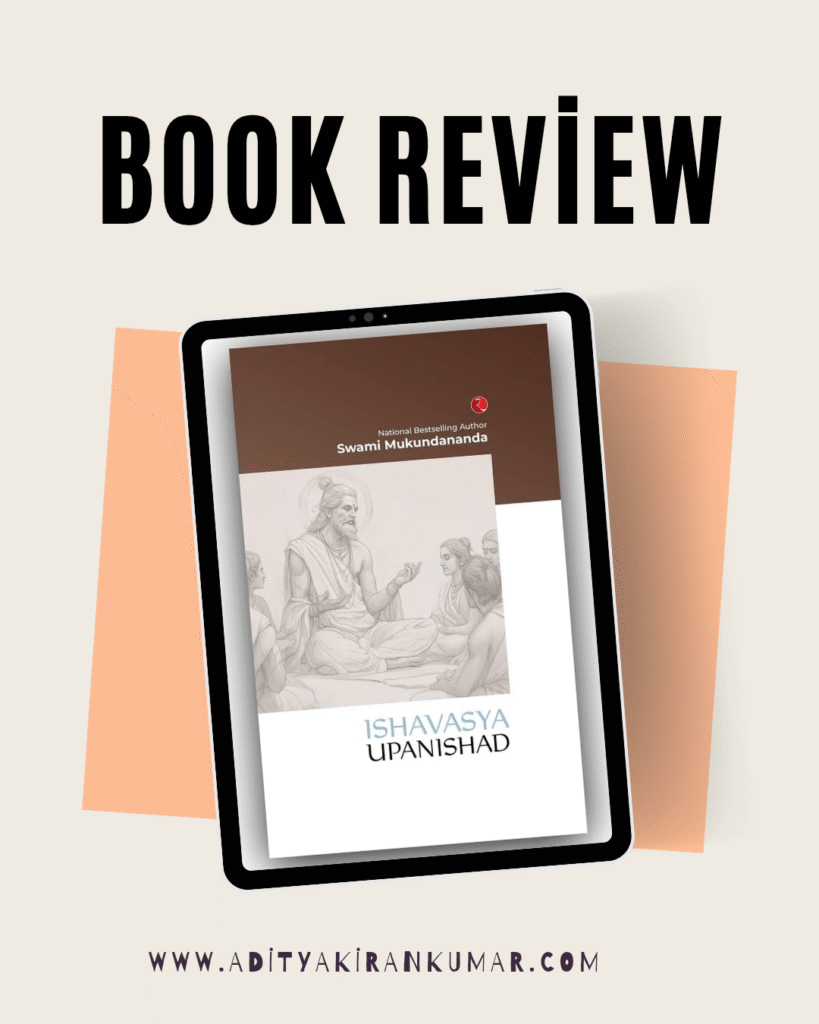
As a prelude, following in the footsteps of Jagadguru Shree Kripaluji Maharaj, Swami Mukundananda sets the stage with a profound and insightful exposition of the Upanishads and the blessings they bring to humanity. He emphasizes that “knowledge is the first step in the implementation of any technique,” highlighting that harnessing knowledge and wisdom is the essence of human material existence.
सत्यम् ज्नञम् अनन्तम् ब्रह्म ॥ (satyam jnañam anantam brahma.)
Inquisitive Emphasis..!!
I deeply admire Swami Mukundananda ji’s exposition on the four deformities of human knowledge—Bhrama, Pramada, Vipralipsa, and Karanapatava—that obstruct the flow of true wisdom. These weaknesses in human understanding contrast profoundly with the Upanishads, which originated from Bhagavan Himself, remaining flawless and free from distortions. Swamiji’s insightful citation and critical dissection of various philosophical schools with respect to the Upanishads enrich the reader’s comprehension. The exalted works of sages like Acharya Madhwa, through their Bhashyas and Vyakhyanas, also enhance the learning of these profound doctrinal teachings.
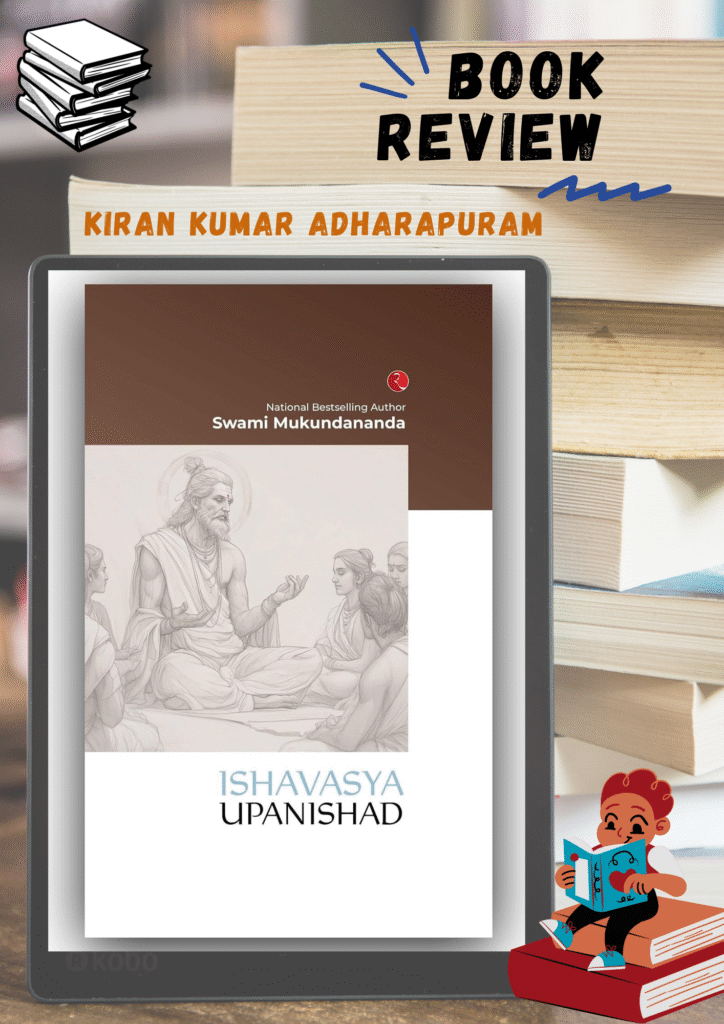
Key Highlight(s)..!!!
For new readers who are eager to maintain a steady knowledge flow and enjoy a blissful reading experience, Swamiji wonderfully frames the preliminary foundations and provides a comprehensive glossary elucidating complex Vedic terminologies and their conceptual essence. This enables readers to extol the Supreme Bhagavan and His divine play wholeheartedly.
Book Accolades..!!
Referencing the Kripalu Toshini Teeka, Swamiji presents each shloka with a structured, phased approach—starting with the original संस्कृत shloka, followed by transliteration, detailed commentary, and relevant scholarly citations. This approach kept me thoroughly engaged throughout the read. Every shloka’s explanation culminates in a holistic interpretation that beautifully reveals the underlying intent. Rather than adhering to a single philosophical school, I greatly appreciate Swamiji’s commendable scholastic breadth and impartiality. He also skilfully unveils deeper connections within the shlokas, enriching the discourse with ample use cases and vivid verbal illustrations.
Conformistic Applaud…!!
This book is a vibrant source, perfectly suited to quench one’s thirst for Vedic knowledge—an indubitable granary of wisdom from Swami Mukundananda, authored under the divine guidance of Shree Kripaluji Maharaj. I highly recommend reading सनातन वेद सारम् (Sanatana Veda Saram) to get ennobled with भक्ति, ज्ञान, और वैराग्य (Bhakti, Jnana, and Vairagya). Inspired by this experience, I now wish to delve deeper into Swami Mukundananda’s discourses and प्रवचनों.
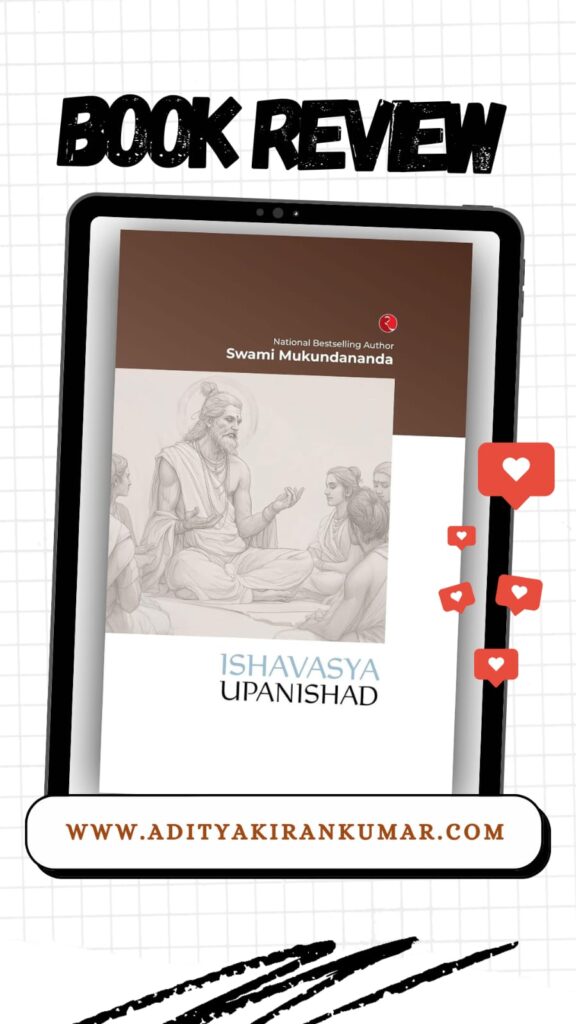
Conclusion..!!
Special appreciation to Team Rupa Publishers for bringing forth such exceptional works that preserve the faith of Hinduism and uphold the timeless principles of Sanatana Dharma (धर्मो रक्षति रक्षितः).
Quote(s)..!!
- Upanishads reveal the nature of the absolute truth.
- Knowledge is the first step in the implementation of any technique
- All relationships and possessions in the world are temporary.
ॐ असतो मा सद्गमय। तमसो मा ज्योतिर्गमय।
मृत्योर्मा अमृतं गमय। ॐ शान्तिः शान्तिः शान्तिः॥
——————————————–सर्वं श्री कृष्णार्पणमस्तु ———————————————
Links & FootNote..!!
My Handle: Kiran_Kumar_Adharapuram
You can also explore my works -> Here
My Non-Fiction Book Reviews -> Here
My Fiction Book Reviews -> Here
My Self-Help Book Reviews -> Here

